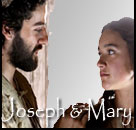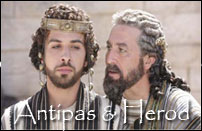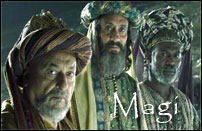The Nativity Story: "The Still, Small Voice"
Audio version:
The main message The Nativity Story is the new cinematic presentation of the events surrounding the birth of Jesus by director Catherine Hardwicke. One scene serves to summarize the overall theme of the movie. Ruth, one of Mary's Nazareth neighbors, tells the village children the story of Elijah's encounter with God as recorded in 1 Kings 19:1-13. God was not in the wind, the earthquake, or the fire, but He spoke to Elijah in "a still small voice."
The Nativity Story is the new cinematic presentation of the events surrounding the birth of Jesus by director Catherine Hardwicke. One scene serves to summarize the overall theme of the movie. Ruth, one of Mary's Nazareth neighbors, tells the village children the story of Elijah's encounter with God as recorded in 1 Kings 19:1-13. God was not in the wind, the earthquake, or the fire, but He spoke to Elijah in "a still small voice."
In fulfillment of God's promise to exalt the humble and bring down the exalted, Jesus was not born to the imperial family in the capital city of the empire. He was not even born into the provincial aristocracy of Jerusalem. He was born in tiny Bethlehem to peasant parents from Nazareth, a town so insignificant that it is not even mentioned in the Old Testament, the Apocrypha, Josephus, or rabbinic literature.
Today Nazareth is a thriving city of more than 70,000 (see My Holyland photo). But in the first century it hardly qualified to be a village. Archaeologists have estimated its population at that time to have been about 400, based on the area enclosed by the tombs surrounding it. The Nativity Story's Nazareth is a "podunk"; Nazareth scenes were shot in a small village of Morocco.
Family troubles The movie also moves us to think about the price Mary and her spouse-to-be Joseph had to pay to serve as mother and foster father of Jesus. The estrangement from their former friends and undercurrent of gossip portrayed in the film nevertheless probably understates the humiliation of their circumstances. Not only was Jesus born to a working-class family; many must have assumed he was an illegitimate "child of fornication."
The movie also moves us to think about the price Mary and her spouse-to-be Joseph had to pay to serve as mother and foster father of Jesus. The estrangement from their former friends and undercurrent of gossip portrayed in the film nevertheless probably understates the humiliation of their circumstances. Not only was Jesus born to a working-class family; many must have assumed he was an illegitimate "child of fornication."
Huge contrast
Juxtaposed with this portrayal of the anawim, the pious poor, is King Herod, vassal-king of Judea, Perea, and Galilee, incredibly wealthy but spiritually bankrupt. King Herod makes a show of being devoted to Judaism. At the same time, however,  he plots to thwart the messianic prophecies by killing the predicted Messiah as soon as he appears. Herod does this in consultation with his son Antipas, intimidating and threatening the young man. Having such a father explains his conduct 30 years later when Herod Antipas executes John the Baptizer and mocks Jesus during His trial.
he plots to thwart the messianic prophecies by killing the predicted Messiah as soon as he appears. Herod does this in consultation with his son Antipas, intimidating and threatening the young man. Having such a father explains his conduct 30 years later when Herod Antipas executes John the Baptizer and mocks Jesus during His trial.
Is that in the text?
My quibbles with the film mainly involve the  Magi, portrayed along traditional lines that include their number (three), their names (Gaspar, Melchior, and Balthasar), and their races (one is African). Not one of these things is attested by the gospel accounts. Another deviation from the biblical text is their decision not to report to King Herod, uninformed by a heaven-sent dream as in Matthew 2:12.
Magi, portrayed along traditional lines that include their number (three), their names (Gaspar, Melchior, and Balthasar), and their races (one is African). Not one of these things is attested by the gospel accounts. Another deviation from the biblical text is their decision not to report to King Herod, uninformed by a heaven-sent dream as in Matthew 2:12.
Also following tradition instead of Scripture, the Magi arrive to pay homage to the Christ child on the night of his birth. This ignores the verse in Matthew that says the holy family was in a house when the wise men arrived (Matthew 2:11). Neither does the escape to Egypt begin on the night of Christ's birth as the movie suggests, for Joseph and Mary had not yet left for Egypt when they circumcised Jesus on his eighth day and then presented Him in the temple in Jerusalem 40 days after his birth, in keeping with the Law's requirements in Exodus 13 (see Luke 2:21-38). That means the clandestine trip to Egypt could take place no sooner than eight weeks after the Nativity.
Outstanding choices
The Nativity Story is remarkable in its use of music, which includes traditional tunes of the season such as Veni Emmanuel, Carol of the Bells, and Silent Night--some choral and some instrumental--introduced in a tasteful, understated way, and combined with an original score with by Mychael Danna that has a distinctly middle-eastern flavor. You may want to read Jonathan Broxton's more detailed review of the film's music.
Likewise the casting is praiseworthy: with regard to Mary (Keisha Castle-Hughes), Joseph (Omar Isaac), King Herod (Claran Hinds), Antipas (Alessandro Giuggioli), and the rest, no one seemed miscast, with the possible exception of Zechariah (Stanley Townsend), who reminded me too much of Fiddler on the Roof's Tevye.
Evaluation
All in all, The Nativity Story is well worth seeing. Unlike most cinematic offerings, it has no sex, no violence, no surprising twists of the plot. In the place of all of these things, it provides an opportunity for spiritual reflection on the meaning of personal sacrifice, consecration despite undeserved criticism, and the divine value system, topsy turvy to that of the world. God chooses not to shout with a giga-boosted megaphone of the Superbowl announcer: "Ladies and gentlemen! Are you ready for some RELIGION? HERE HE IS: YOOOOUUUURRRRR MEHHHH-SIIIII-AAAAHHH!" Instead, He points one star toward a stable, holds a private concert for a few shepherds, and speaks with a still small voice: a neonatal, human voice. "Peace on earth, good will to men," He whispers.
Want to go deeper?
Nazareth – You can explore the official website for the city of Nazareth, which includes a live webcam view of the Church of the Annunciation, a summary of the history and archaeology of the city, and all the touristy things available in Nazareth.
Biblical accounts – The Nativity is reported in Matthew 1:18-2:23 and Luke 1 and 2. You may be surprised to discover that the Magi and escape to Egypt are only in Matthew, while the shepherds are only in Luke. Our traditional presentation is a harmonization of the two.
King Herod – You can read about the ruthlessness of King Herod in all of book one, ¶201 to ¶670 (Whiston: 1.9 - 1.33) of The Jewish War by Josephus. According to Matthew, he died soon after Joseph, Mary, and Jesus escape to Egypt, which would put the birth of Jesus somewhere near the end of book one.
Steve Singleton, DeeperStudy.com
» Post a Comment